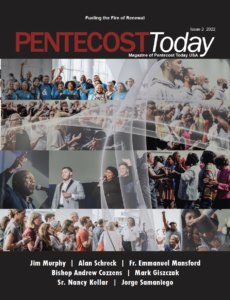Meditation and Questions for Reflection or Group Discussion
Mass Readings:
1st Reading: Malachi 1:14–2:2, 8-10
Responsorial: Psalm 131:1-3
2nd Reading: 1 Thessalonians 2:7-9, 13
Gospel: Matthew 23:1-12
The Centrality of Love in All Our Relationships
With such affection . . .(1 Thessalonians 2:8)
Isn’t it remarkable how easy it is to think it’s our job to teach, judge, or lead other people? We see this everywhere—at work, in our parish, in schools, even at home. The problem is that in our zeal, it’s easy to forget about the most important quality: love.
In today’s second reading, St. Paul recalls how dedicated he and his companions were in nurturing the believers in Thessalonica. He and Silvanus and Timothy made it their goal to share the gospel with them. They talked about Jesus’ resurrection and the new life he had won for them. They talked about the power of the Holy Spirit to change their lives. They talked about the lure of sin and about our need to stay alert and on guard.
As he focused on points of doctrine like these, Paul was careful to speak about them in terms of love: God’s love for the Thessalonians and the Thessalonians’ call to love each other in return. For Paul, this was the most important thing. Love was the glue that held everything together. “We were gentle among you,” he tells them, adding that he and his companions treated them “as a nursing mother cares for her children” (1 Thessalonians 2:7). What a tender image!
In what many people have called the greatest chapter in Scripture, Paul told the Corinthian believers about the centrality of love (1 Corinthians 13). Having powerful spiritual gifts or great faith or deep knowledge are as nothing without love, he wrote.
So whatever you do today, make sure it is built on a foundation of love. Ask the Holy Spirit to show you God’s love for you more deeply and more personally so that you can love him in return. Ask him to help you share your love with just one person today. It doesn’t have to be a grand gesture; it just has to be sincere. God can take it from there.
“Thank you, Lord, for your gift of love. Help me to love people as faithfully as you love me.”
Download this reflection with discussion questions here.
(Many thanks to The Word Among Us for allowing us to use meditations from their monthly devotional magazine. Used with permission. For more information on how to subscribe to their devotional magazine, go to www.wau.org).
Sunday, November 5, 2017
Questions for Reflection or Discussion
- In the first reading the Lord, through the prophet Malachi, speaks difficult words to the priests in Israel: “If you do not listen, if you do not lay it to heart, to give glory to my name, says the LORD of hosts, I will send a curse upon you and of your blessing I will make a curse. You have turned aside from the way, and have caused many to falter by your instruction; you have made void the covenant of Levi.”
- Why do you think the Lord’s words to the priests were so harsh that he would “make a curse” of those who have “caused many to falter” by their instruction?
- What are the things you may be doing or saying that do not set an appropriate example of what it means to be a Christian to those with whom you come into contact? What steps can you take to change this?
- In the responsorial psalm, the psalmist speaks of the ways he has tried to live a life pleasing to the Lord: “O LORD, my heart is not proud, nor are my eyes haughty; I busy not myself with great things, nor with things too sublime for me. Nay rather, I have stilled and quieted my soul like a weaned child. Like a weaned child on its mother’s lap, so is my soul within me.” The psalm ends with these words: O Israel, hope in the LORD, both now and forever.”
- What do you think the psalmist meant when he said: “I have stilled and quieted my soul like a weaned child.”
- What are the things that keep your soul from being “stilled and quieted” during times of prayer, at Mass, or during the day? How do they impact your “hope in the LORD”? How can you change this?
- In the second reading, Paul describes his behavior towards the Thessalonians this way: “We were gentle among you, as a nursing mother cares for her children. With such affection for you, we were determined to share with you not only the gospel of God, but our very selves as well, so dearly beloved had you become to us. You recall, brothers and sisters, our toil and drudgery. Working night and day in order not to burden any of you, we proclaimed to you the gospel of God.”
- Why do you think St. Paul felt it was so important that his behavior be gentle, caring, and affectionate – especially since he was sharing the “gospel of God” with the Thessalonians?
- In what ways does gentle, caring, and affectionate describe how you relate to your family and others? How could improving in how you relate to others make a difference when opportunities to share your faith arise?
- In the Gospel reading, Jesus instructs the crowds and his disciples on how to relate to the scribes and the Pharisees. He tells them to “do and observe all things whatsoever they tell you, but do not follow their example. For they preach but they do not practice. They tie up heavy burdens hard to carry and lay them on people’s shoulders, but they will not lift a finger to move them. All their works are performed to be seen.” The Gospel reading ends with these challenging words of Christ, “Whoever exalts himself will be humbled; but whoever humbles himself will be exalted.”
- The behavior of the scribes and the Pharisees did not match their words. Why do you think this was particularly onerous to Jesus? In what ways do these words apply to you?
- If your family, or fellow parishioners, or others were asked, would they describe you as a good example of what it means to be a Christian? If you are not sure, what are the things you might need to change?
- The meditation is a reflection on the second reading, and it emphasizes that even as Paul preached various “points of doctrine” to the Thessalonians, he was: “careful to speak about them in terms of love: God’s love for the Thessalonians and the Thessalonians’ call to love each other in return. For Paul, this was the most important thing. Love was the glue that held everything together.” The meditation ends with these words: “So whatever you do today, make sure it is built on a foundation of love. Ask the Holy Spirit to show you God’s love for you more deeply and more personally so that you can love him in return. Ask him to help you share your love with just one person today. It doesn’t have to be a grand gesture; it just has to be sincere. God can take it from there.”
- What do you think is the meaning of the above words from the meditation?
- Why do you think that when it comes to the understanding the Gospel message, and sharing it with others, that love is the “glue that holds everything together”?
- Take some time now to pray and thank the Lord for his great love for you and ask him for the grace to love others as he has loved you. Use the prayer below from the end of the meditation as the starting point.
“Thank you, Lord, for your gift of love. Help me to love people as faithfully as you love me.”
[The discussion questions were created by Maurice Blumberg, who is in partner relations for The Word Among Us Partners, (http://www.waupartners.org/); a ministry of The Word Among Us (www.wau.org) to the military, prisoners, women with crisis pregnancies or who have had abortions, and college students. He is also a member of the National Service Committee Council of the Catholic Charismatic Renewal (https://www.nsc-chariscenter.org/) and a member of the board of directors of the Christlife Catholic Ministry for Evangelization (https://christlife.org/). Maurice was also the founding Executive Director of the National Fellowship of Catholic Men. He can be contacted at (Enable Javascript to see the email address) mblumberg@wau.org or mblumberg@aol.com.]


 Click Here for us to pray for your intentions through our new website.
Click Here for us to pray for your intentions through our new website. 
